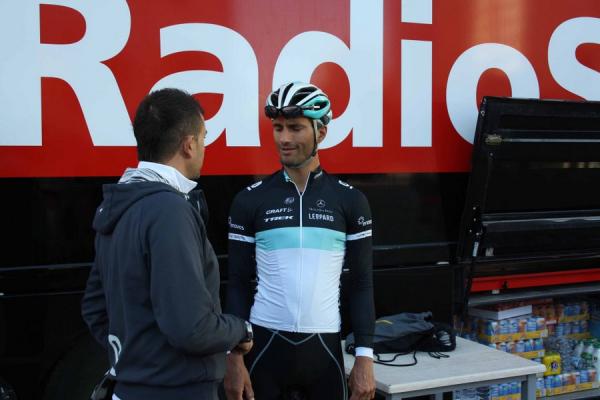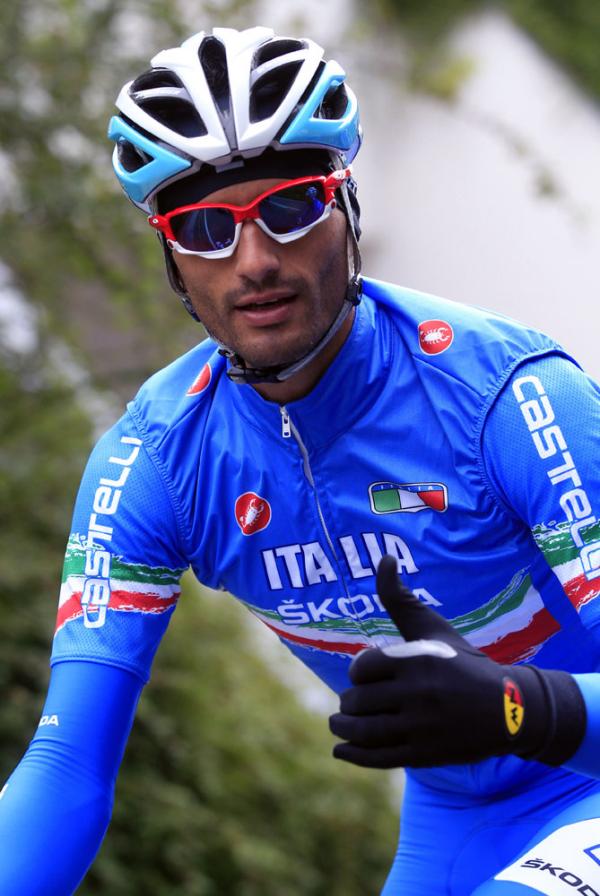Bennati stung by winter of Worlds criticism
Reaction to Italian showing exaggerated says RadioShack-Nissan rider


Daniele Bennati feels that he has shouldered a disproportionate amount of the blame for his part in Italy’s disappointing world championships showing in Copenhagen in September. The Tuscan could only finish 14th after the Italian lead-out train derailed in a frenetic finale and faced stinging criticism in the aftermath.
If cyclo-cross is Belgium’s winter sport, the off-season pastime of choice in Italy is polemica, particularly in the long dark months that followed the country’s worst world championships finish since 1983. Bennati believes that such extreme reactions to the success or failure of the squadra azzurra are not justified.
“Sometimes I think it’s a bit exaggerated,” Bennati told Cyclingnews at RadioShack-Nissan’s recent training camp in Calpe. “When we talk about the Worlds, it always seems to be a question of life or death. Either I won the Worlds or I was going to be criticised, and people were going to be throwing stones at yours truly. And that’s something that I don’t think is right.
“I wasn’t even given the chance to reply to the critics, and this isn’t fair. People should listen to what the critics say, but also to the target of their criticism. This was never granted to me.”
The Italian challenge fell apart on the final roundabout of the Copenhagen course, when Bennati lost the wheel of his lead-out train. He was unable to make his way back to the front amid the tumult of the final kilometres.
“I take my responsibility because I was the leader, but the blame lies with everybody and not just me, because we all know my characteristics,” Bennati said. “To do well, or to win a big race like the Worlds, I need a train. At the Worlds there wasn’t one, so I really don’t think it’s right that the blame is all heaped on top of me.
“If I’d been in the ideal position and been able to do my sprint without problems, and then finished 13th or 14th, I could have accepted the criticism. But I didn’t have the chance to do my sprint. I was shut in by riders on my left and right and in the last two kilometres, I didn’t have a lead out.
Get The Leadout Newsletter
The latest race content, interviews, features, reviews and expert buying guides, direct to your inbox!
“I don’t think I would have been able to win that Worlds because Cavendish and his team were really very strong, but I do think a podium place was certainly possible. Greipel made up a lot of ground to finish third, while Cancellara did very well on a course that didn't suit him thanks in part to Rast's lead-out."
Criticism
Bennati insisted that his memories of the build-up to the Copenhagen Worlds had not been tempered by the bitter that followed. “It was a wonderful experience right up to the race itself. It was really fantastic to be part of that team in the days leading up to it, but the aftermath was ugly,” he said. “I was a little bit prepared for it beforehand, but I didn’t expect to finish 14th on a route like that with the excellent condition that I had.”
While Bennati insisted that the missed opportunity stung him more than the harsh words of some former world champions, he admitted that he was disappointed that many of his past achievements were forgotten in the welter of criticism that came his way in September.
“They’ve labelled me a loser even though I’ve won over 50 races in my career,” Bennati said. “I don’t think there are too many riders still active who have won stages in the Giro, Tour and the Vuelta so maybe some other riders who have won far less are praised far more. I think they appreciate me more abroad than they do in Italy, and that’s not nice.”
In future, Bennati believes that the Italian squad should go to the Worlds with its ambitions placed a little more in check. "Sometimes you need to re-dimension things a little bit. Instead of saying, ‘we’re going to the Worlds to win’, you should go there looking to get a great result, and then if the win follows, so much the better."
Warning
Italy’s disappointing Worlds also coincided with the first year of its federation’s new ruling which bars riders who have been sanctioned for doping from selection for the national team.
“I think it’s right in terms of sending out a strong message, to renew the good image that Italian cycling could have in the eyes of the public,” Bennati said. “But when a rider comes back after a suspension, he can ride with a big team, and has the possibility of riding the most important international races, so it seems a bit strange to me that he can’t take part in the Worlds.”
At one point in June, it looked as though Bennati himself would be unable to represent Italy again, due to his positive test for betamethasone in 2005. He was handed a warning after it was accepted that an undeclared anti-inflammatory cream had triggered the positive, but was sweating on his status until the Italian federation specified that only riders who had served bans of six months or more were to be excluded.
“I received this warning from the federation and I accepted it, but I didn’t serve an hour of suspension,” Bennati said. “It was something that even my parents didn’t know about – honestly, I didn’t want to worry my parents with things like that. Then six years on, I found myself in all the papers and magazines. I woke up that morning and I felt like shit. Something like that can’t happen. In that moment, my image was ruined, and for what?
“I was being associated with riders who had been disqualified for actual acts of doping, guys who had been banned for two years and more. Yet, in the eyes of the public, I was being included in that group, and it was ridiculous.”
The FCI ruling comes at a time when Italian cycling appears caught in lengthy transitional period, reflected by the fact that three years have now passed since the country's last classics victory. However, Bennati believes the reasons for the relative lack of success in recent seasons is due at least in part to rising levels elsewhere.
“Now there are talents being born all over the world and not just in the ‘traditional’ cycling nations,” he said. “It’s more international now. The level has risen accordingly, and the Italians are suffering.”

Barry Ryan was Head of Features at Cyclingnews. He has covered professional cycling since 2010, reporting from the Tour de France, Giro d’Italia and events from Argentina to Japan. His writing has appeared in The Independent, Procycling and Cycling Plus. He is the author of The Ascent: Sean Kelly, Stephen Roche and the Rise of Irish Cycling’s Golden Generation, published by Gill Books.